Share
Working at ESO
Are you interested in working in areas of frontline technology and in a stimulating international environment? Do you feel your profile matches our requirements? Learn more about our current vacancies and apply online. Read more..
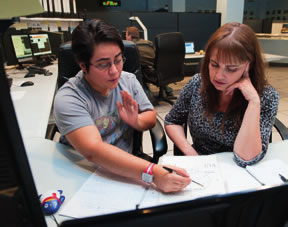
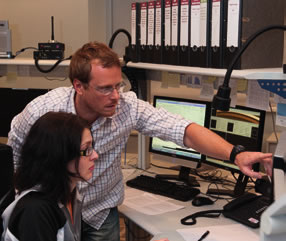

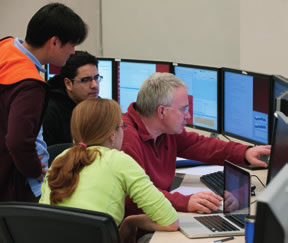
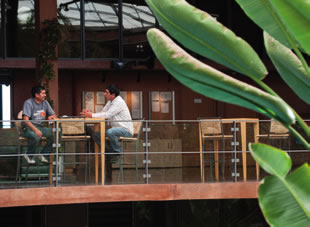

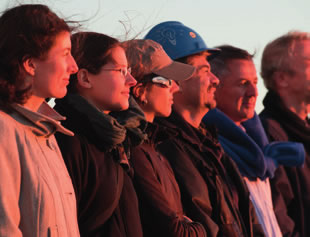
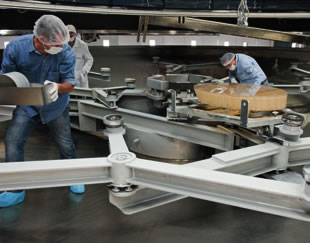
The European Organisation for Astronomical Research in the Southern Hemisphere (ESO) is the foremost intergovernmental astronomy organisation in Europe and the world's most productive astronomical observatory. ESO operates three unique world-class observing sites in the Atacama Desert region of Chile: La Silla, Paranal and Chajnantor. The ESO headquarters are located in Garching, near Munich, Germany. ESO is the focal point for Europe's participation in the Atacama Large Millimeter Array (ALMA) consortium, which is currently constructing a large submillimetre array in the Chilean Andes. The concept and design of a 39-m European Extremely Large Telescope (E-ELT) is also currently underway at ESO.
For the Directorate of Engineering (DoE) at the Headquarters in Garching near Munich, Germany, ESO is opening the position of
Adaptive Optics Physicist
Garching
Deadline 23/11/2014
The successful applicant will be part of the Adaptive Optics Systems Group (AOSY) of the System Engineering Department within DoE.
AOSY is a world leading group in building state-of-the art Adaptive Optics (AO) systems feeding a wide range of astronomical instrumentation (cameras, spectrometers, interferometers) for the telescopes of ESO's La Silla-Paranal Observatory and for the future E-ELT. To date, there are 7 AO systems routinely in operation, and an additional one ready to be offered to the community.
For the ESO Very Large Telescope, AOSY is a key player in the development of the Adaptive Optics Facility project, which consists in upgrading Yepun (UT4) to make it an adaptive telescope by replacing the actual secondary mirror by a deformable one, associated to 4 Laser Guide Star Units and two AO modules serving HAWK-I a wide field IR imager and MUSE a visible 3D spectrograph. AOF is now undergoing system tests in Garching and will be shipped to Paranal in 2015.
AOSY is also involved in the development of 4 AO modules for the VLTI Auxiliary Telescopes (NAOMI) and is participating to the definition of the AO systems for the E-ELT.
Some of these developments are done in-house at ESO - when manufacturing is usually sub-contracted to industry - but most are developed and built by consortia of Institutes in the community, with ESO being the customer for these instruments.
We are looking for an experienced AO physicist with a strong background in the field of AO technologies and with demonstrated skills in AO system engineering. He/she will be involved in the AOF system tests and commissioning, the future new VLT AO modules and the first light AO instruments for E-ELT including the interactions with the telescope control strategy.
Main Duties and Responsibilities:
The successful candidate will
- Work within the team responsible for the system tests and commissioning of the AOF for the VLT and contribute to the handover of the complete facility to the Paranal Observatory;
- Be in charge of the system engineering and testing of one new VLT AO module, in close coordination with the instrument project manager and system engineer;
- Participate to the E-ELT development for what concerns AO activities;
- Prepare and release the technical documentation associated to the AO system and sub-systems development and follow-up the procurement of these sub-systems under the responsibility of the instrument project manager;
- Be in charge of establishing and managing the complete AO error budgets and of maintaining the AO performance all along the complete development cycle of the AO module;
- Interface with external consortia in charge of AO module development for ESO instruments, in the framework of VLT and/or E-ELT; and
- Provide support to the Observatory staff for maintenance and problem solving for delivered AO modules.
Duty trips, e.g. to ESO sites in Chile, are required.
Reports to:
The Head of the Adaptive Optics Systems Group
Experience:
- At least five years of demonstrated experience in AO system engineering including design, development,integration and verification in the lab and on-sky;
- Very good background in Physics related to high angular resolution imaging, atmospheric optics and adaptive optics;
- Knowledge about AO technologies such as deformable mirrors, wavefront sensing, AO control and calibration;
- Several years of experience in working in large multi-disciplinary teams; and
- Proficiency in a computer simulation tool (MATLAB, IDL...)
Key Competences:
- Work both on your own initiative and as part of a team;
- Take over responsibilities and take decisions;
- Build strong collaborative working relationships with people from different cultural backgrounds and disciplines;
- Flexibility in adapting to changes of requirements and priorities as well as of assignments; and
- Capability to work for different projects and with different teams (matrix structure), also in parallel.
Qualifications:
Engineering or PhD degree in Physics or equivalent
Language Skills:
Excellent command of the English language
Remuneration and Contract:
ESO offers an attractive remuneration package including a competitive salary (tax free), comprehensive pension scheme and medical, educational and other social benefits, as well as financial help in relocating your family and the possibility to place your child/children in daycare.
The initial contract is for a period of three years with the possibility of a fixed-term or indefinite extension based on technical and managerial achievements. The grade may be subject to change according to qualification and the number of years of experience.
Duty Station:
Garching near Munich, Germany with regular duty trips to all ESO sites in Chile.
Career Path:
V
Starting date:
as soon as possible
Application:
If you are interested in working in areas of frontline technology and in a stimulating international environment, please visit (http://www.eso.org) for further details.
Applicants are invited to apply online via our recruitment portal http://recruitment.eso.org/. Applications must be completed in English and should include a motivation letter and your CV. In your CV you should provide us with the names and contact details of three persons familiar with your work and willing to provide a recommendation letter on request.
Closing date for applications is 23 November 2014.
Interviews are expected to start soon after this date.
Although recruitment preference will be given to nationals of ESO Member States (members are: Austria, Belgium, Brazil, the Czech Republic, Denmark, Finland, France, Germany, Italy, the Netherlands, Portugal, Spain, Sweden, Switzerland and United Kingdom) no nationality is in principle excluded.
The post is equally open to suitably qualified female and male applicants.
